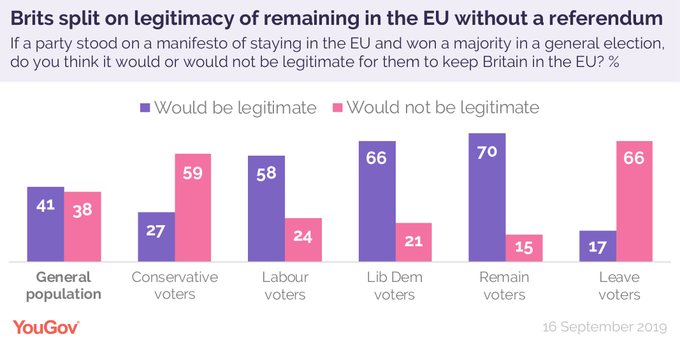In the light of the LibDem policy on revoking article 50 (the abreaction to which I discuss here) YouGov asked people the following question:
“If a party stood on a manifesto of staying in the EU and won a majority in a general election, do you think it would or would not be legitimate for them to keep Britain in the EU?”
41% said that it would be legitimate.
38% said that it would not be legitimate.

This is remarkable.
Note – the question was not whether you support the policy, but whether it would be legitimate or not.
Legitimacy is a higher test than mere liking or disliking. You might dislike something, but to say it is illegitimate is a further step.
And yet 38% said it would be illegitimate.
Consider the same question with the specific content excised:
“If a party stood on a manifesto of X policy and won a majority in a general election, do you think it would or would not be legitimate for them to enact X policy?”
Out of context, most people would say it would always be legitimate, every single time.
What would the argument be that it was illegitimate in this case? Is it that only a referendum can overturn a previous referendum?
If so, are those Leave voters (see above) who responded 66% to 17% that it would be illegitimate now in favour of a confirmatory referendum?
If so, are they going to support one before a general election?
If not, then they can hardly blame the LibDems for using the next best thing to promote their position.
If they argue a general election must happen first, then what is the threshold of remain-supporting vote before a confirmatory referendum is required? And would it be by seat or by overall vote? So many questions.
The LibDems are smart. They’ve shifted the debate to where it should be: to the key questions of legitimacy of mandates, past and future, direct and indirect.
Under scrutiny, the existing mandate stinks. 2016 was not mandatory. It was not inclusive, fair, legal or compelling. It was as bent as a nine-ruble note.
It’s time to have that detailed conversation about mandates. Bring it on.
